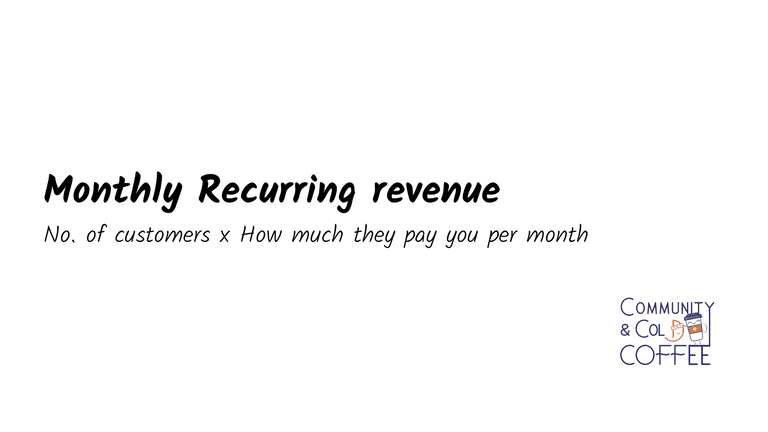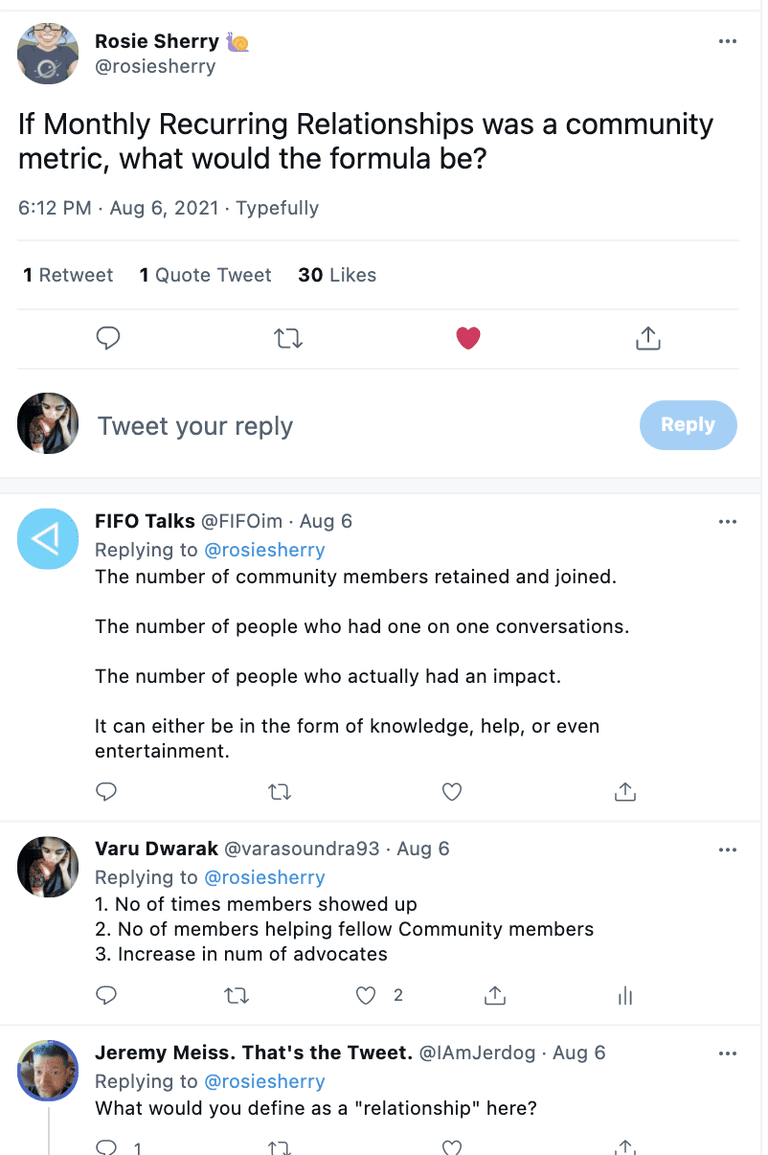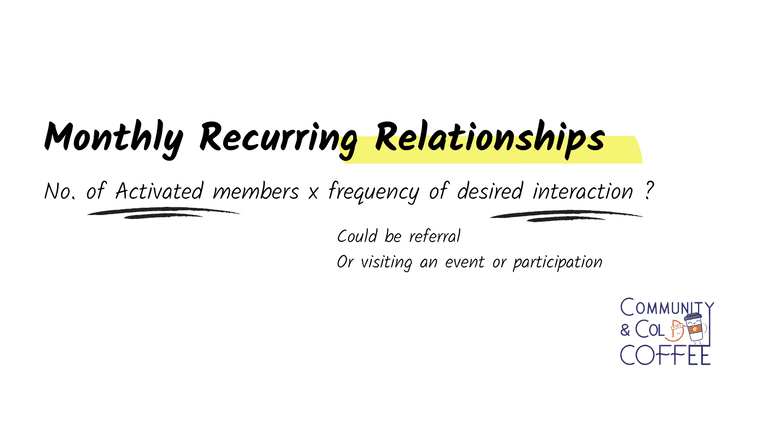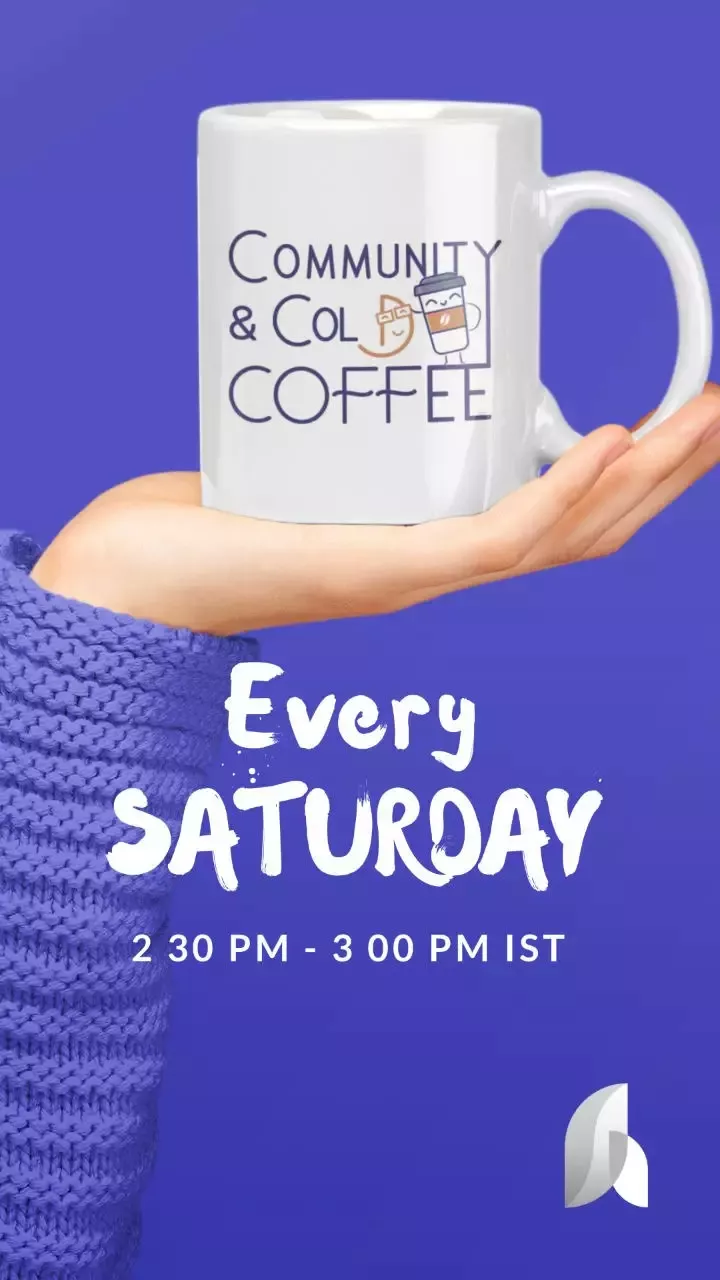Community & Cold Coffee🥤😎 | Ep 1: Monthly Recurring Relationships, Offline Communities & Events
Episode 1 BTS, Aug 7, Saturday 2 PM
Community & Cold Coffee (C³) is an initiative to bring community professionals or enthusiasts together to discuss the Community ecosystem, methods, and techniques, etc. candidly. No agenda is our agenda. Community & Cold Coffee happens on all Saturdays at 2.30 PM, which means you can hop in at 2.30 PM on Saturday and chat your heart out about communities.
NOTE: Don’t forget to bring your Cold coffee 😜
Paying Gratitude via courtesy
Thanks to Rosie Sherry for that amazing connection around MRR which stated, “If Monthly Recurring Relationships was a community metric, what would the formula be? ''
We thought that this is something that any community professional should think about. This whole episode was a genuine approach to give a thought to it and derive a formula for Rosie’s MRR (We should add this in the glossary for sure).
Here is what we discussed!
Decoding Rosie’s MRR Formula - Monthly Recurring Relationships as Community Metric
What is an MRR in general?
MRR is a very commonly used and significant term and metric to measure the revenue of any SaaS-based company.
MRR = Number of paying members * Average price customer pays per month

But, long-term relationships = long-term revenue and that’s why Rosie has brought the most possible but very underrated metric “relationships” here. Here is the thread for reference

#1 The conversation took a start on this idea, “What you can’t measure is what you can’t improvise.” People in SAAS trust MRR because it has a metric attached to it.
Varalakshmi’s question was: “So, how do we measure Relationships?”
1. How can you put a number to emotions? Can you? Maybe parameters would guide you to where you want to derive and they were able to come up with a few of them. For instance, CSAT scores, NPS scores, advocacy, referral, and of course retention very well can be associated with relationships and revenue because if you retain you are happy with association, and if you refer or advocate, you are so happy that you want others to gain the value too. In terms of community, how do we measure that?
“You need a number, right?”
Yes, the main point of this conversation was to find a way that could quantify the growth of a community.
Deepak had an amazing point of tying this to the intended action.
2. What is that people give in a community? This can possibly lead you to a number. Going through this thought, what community members give constitutes the value? The value can be of any form such as blogs, posts, comments, likes, referrals, etc.
Relationships = Return of Expectations
Deepak made this simple by putting it this way, the number of times people appreciate or refer to someone is a number and you can put a number to it. Now that you have a number, the strings are loose now. So, the closest formula could be
Number of Active Members * Avg number of expected Interactions of Community members
Going backward to decode recurring relationships and active members
3. What does a recurring relationship mean? Recurring relationships start coming back to you as they have gained value and they want to give it back.
Exchange of value = Recurring Relationship
Example of Exchange of value
The community produces 2 use cases = User marks it helpful | The community runs events to discuss community voted use cases = No of attendees from the community |
4. How do you decide who is an active member?
In a large community, deciding who could be labeled as an active member is going to be quite tricky. If we try to understand the core, people who contribute to the community are considered as active members, but at the same time, it differs with each community and its values can be a relative term. But, what could be the closest possibility is
Active member = Members contributing to community meaningfully (defined by assigned success metric of the community)
Now, try to link to Monthly Recurring Relationships

This might lead you to find out the MRR in a community.
Offline communities, Events, and linking back to Recurring Relationships: Chat with Anupam Kaushik
With these on the table, we had Mr. Anupam, a community enthusiast who has been hosting 3 communities offline and has now taken a step to get a place in the online community building forum.
His path on this change has not been easy but he had to fail thrice in a year. But he’s a fighter, and that’s why he’s now doing great with online community building too. A word from such an experienced person helps us set our path right in community building when it's our turn.
Anupam Kaushik shares
“Online and offline community building is not that different,” says Anupam as he’s been down both the roads. He’s found out that the difference among them is very minimal, which is a shout-out for a lot of people who fear that it's not going to work out online. Hear from Anupam, it's not that difficult.
Another experience that can be of great help for a person who builds a community is this, so here’s how the story goes,
He used to conduct a lot of events for free, and once a man asked Anupam
Anupam’s friend: Why don’t you charge for your event?
Anupam: I didn’t feel the need to.
What he replied served as a turning point for him.
Anupam’s friend: If you don’t take your content seriously, no one will.
This made Anupam think and so he decided to charge from his next event and to his surprise, it turned out to be an interesting turnout, where there were more members than usual. (Increase 2x).
This is when he started to make content that will benefit the people who take part in the event. That is, he started doing for the community to make it successful for all the stakeholders involved. This made him responsible and at the same time, the people who participated reflected the same.
Back to our findings,
Exchange of value leads to Recurring Relationship
Takeaways
1. Relationships = Return of Expectations
2. Exchange of value = Recurring Relationship
3. Active member = Members contributing to community meaningfully (defined by assigned success metric of the community)
4. Derived MRR Formula = Number of Active Members * Avg number of expected Interactions of Community members

Now, if you agree or agree to disagree, let us know via comments and also join us at Community & Cold Coffee on Saturday at 2.30 PM. Have a great week ahead folks.


 Habitate
Habitate